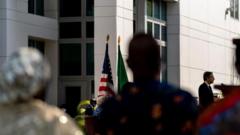Peter Obi and Atiku Abubakar's strategic alliance signifies significant political shift, aiming to consolidate opposition and challenge the status quo.
Nigerian Political Landscape Transformed as Major Figures Unite in New Coalition

Nigerian Political Landscape Transformed as Major Figures Unite in New Coalition
Political heavyweights team up to bolster opposition against ruling party as 2027 elections approach.
In a major shift in Nigerian politics, two leading opposition figures, Atiku Abubakar and Peter Obi, have come together to form a unified front by joining the African Democratic Congress (ADC). This move comes as they seek to create a formidable challenge against President Bola Tinubu and his ruling All Progressives Congress (APC) in the upcoming 2027 elections.
Both politicians made the decision to leave their previous parties—Abubakar from the Peoples Democratic Party (PDP) and Obi from the Labour Party (LP)—after realizing that a split opposition was detrimental to their chances in the last election. In a tight race in 2023, Tinubu won with just 37% of the vote, while Abubakar and Obi garnered 29% and 25%, respectively.
During the introduction of the ADC, its interim chairman, David Mark, emphasized the coalition's purpose: to preserve Nigeria’s democracy and prevent the emergence of a one-party system. The new party is also drawing support from notable figures within the APC, indicating a broader discontent with the current political landscape.
Political analysts believe that Abubakar, a seasoned politician vying for the presidency for the fifth time, and former governor Obi are taking lessons from their near-success in the last election. "They might have won had they collaborated earlier," said analyst Shehu Iliyasu, remarking on the perceived potential of a joint ticket.
Speculation surrounds the potential candidates within the ADC, with many anticipating that Abubakar will lead the presidential run, paired with Obi as the vice-presidential candidate. Former Senate President David Mark and other former allies and rivals of the current administration have also aligned with this new coalition.
Analysts are divided on the coalition's chances against the ruling party. Some, like Ben Kenneth, are optimistic, claiming that the collaboration significantly boosts their prospects. In contrast, others suggest that Tinubu, having solidified his position, may have better odds for reelection as incumbency often yields advantages in Nigeria.
The APC remains dismissive of the new coalition. Acting chairman Ali Bukar Dalori expressed skepticism about its impact, claiming that the coalition is not a genuine threat and remains isolated from the broader electorate. The PDP and LP have both announced their intention to operate independently, rejecting the idea of joining forces.
As Nigeria navigates through another cycle of electoral politics, this significant alliance raises questions about unity, strategy, and the potential for change in a country deeply rooted in its political divisions.
Both politicians made the decision to leave their previous parties—Abubakar from the Peoples Democratic Party (PDP) and Obi from the Labour Party (LP)—after realizing that a split opposition was detrimental to their chances in the last election. In a tight race in 2023, Tinubu won with just 37% of the vote, while Abubakar and Obi garnered 29% and 25%, respectively.
During the introduction of the ADC, its interim chairman, David Mark, emphasized the coalition's purpose: to preserve Nigeria’s democracy and prevent the emergence of a one-party system. The new party is also drawing support from notable figures within the APC, indicating a broader discontent with the current political landscape.
Political analysts believe that Abubakar, a seasoned politician vying for the presidency for the fifth time, and former governor Obi are taking lessons from their near-success in the last election. "They might have won had they collaborated earlier," said analyst Shehu Iliyasu, remarking on the perceived potential of a joint ticket.
Speculation surrounds the potential candidates within the ADC, with many anticipating that Abubakar will lead the presidential run, paired with Obi as the vice-presidential candidate. Former Senate President David Mark and other former allies and rivals of the current administration have also aligned with this new coalition.
Analysts are divided on the coalition's chances against the ruling party. Some, like Ben Kenneth, are optimistic, claiming that the collaboration significantly boosts their prospects. In contrast, others suggest that Tinubu, having solidified his position, may have better odds for reelection as incumbency often yields advantages in Nigeria.
The APC remains dismissive of the new coalition. Acting chairman Ali Bukar Dalori expressed skepticism about its impact, claiming that the coalition is not a genuine threat and remains isolated from the broader electorate. The PDP and LP have both announced their intention to operate independently, rejecting the idea of joining forces.
As Nigeria navigates through another cycle of electoral politics, this significant alliance raises questions about unity, strategy, and the potential for change in a country deeply rooted in its political divisions.



















